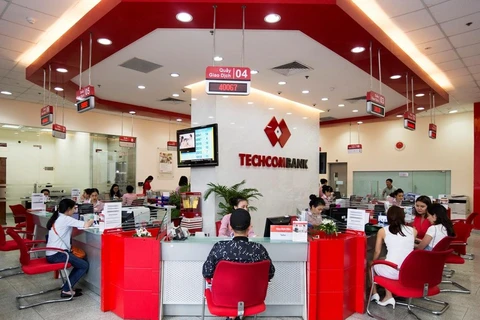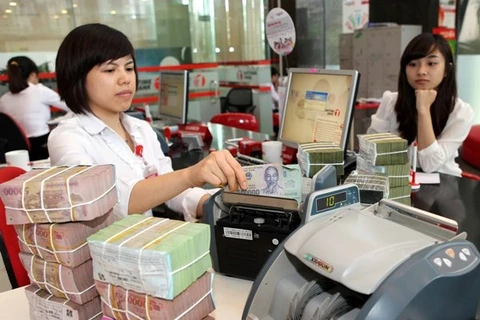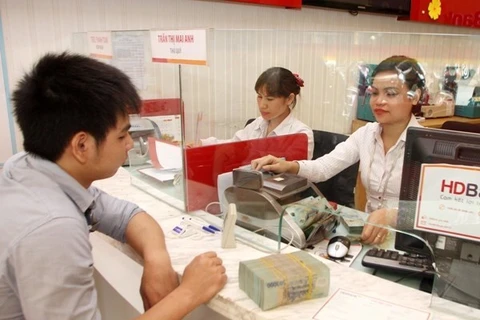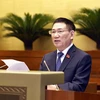Hanoi (VNA) – The State Bank of Vietnam (SBV) had a meeting with commercial banks on March 31 to carry out urgent solutions to address difficulties caused by the COVID-19 pandemic.
According to the SBV, banks have implemented timely measures, such as rescheduling debt repayment deadlines and exempting or reducing interests and payment fees so as to tackle difficulties facing borrowers.
Speaking at the event, Nghiem Xuan Thanh, Chairman of the Board of Directors of the Joint Stock Commercial Bank for Foreign Trade of Vietnam (Vietcombank), affirmed that his bank will apply the interest rate reduction of 1 – 1.5 percent per year for existing loans through September 30, instead of the end of April as announced previously. With this policy, Vietcombank estimated that its profit will shrink by 300 billion VND.
[Banks show strong commitments to accompanying businesses]
Regarding new loans, this bank will issue a package of 30 trillion VND with lending interest rates 2 – 2.5 percent lower than existing ones. In particular, the rates for producers of essential goods will be decreased considerably to around 4.5 – 5 percent annually, much lower than current deposit interest rates.
Since February 11, Vietcombank has reduced interest rates for pandemic-hit businesses, Thanh noted. Outstanding loans worth 112 trillion VND have benefited from interest rate cuts by 1 – 1.5 percent per year.
The bank is also considering some mechanisms for debt restructuring within its competence with the hope that it can help those unable to repay their debts due to COVID-19 as soon as possible and in the most thorough manner, he said.
The Chairman also asked for a consensus from other managerial agencies like the Ministry of Finance and relevant ministries and agencies.
Citing an example, Thanh said some businesses are entitled to tax and fee exemptions, reductions and payment delays, though the banking system wouldn’t benefit from such preferential treatments. As a result, banks are suffering from double difficulties. Firstly, both banks and businesses are in trouble and secondly, banks have to share difficulties facing firms.
He called on the Government, ministries, sectors and managerial agencies to consider banks as enterprises, and only when banks are healthy could they share the burden on other businesses.
Le Duc Tho, Chairman of the Board of Directors of the Vietnam Joint Stock Commercial Bank for Industry and Trade (VietinBank), also pledged to continue considering lending interest rate cuts of 2 percent annually for borrowers doing business in the areas serving people’s basic needs.
In this pandemic, all economic aspects are affected and the extent of the impact is unpredictable. It could be said that the disease outbreak has had immediate, direct and huge impacts on firms in the service industry, he noted.
As of the end of March, VietinBank cut lending interest rates by 0.5 – 1.5 percent annually for nearly 3,000 borrowers, depending on groups of clients and their lending purposes.
Tho said his bank has recently carried out debt restructuring for 350 clients with total outstanding loans of 18 trillion VND, adding that it has also slashed 20 – 50 percent of export/import fees to assist enterprises.
At the meeting, SBV Deputy Governor Dao Minh Tu highly valued some banks’ continued reduction of interest rates by another 2 percent each year to help the business community.
He noted that many commercial banks have brought lending interest rates down by 1 – 1.5 percent annually and that SBV encourages them to cut the rates by at least 2 percent annually, or more, to save companies affected by the COVID-19 outbreak.
Aside from lowering lending interest rates, the official also asked banks to drastically implement such measures as restructuring debts and delaying or extending debt repayment deadlines.
On March 31, the SBV Governor also issued Directive 02/CT-NHNN, aiming to carry out urgent solutions to step up the settlement of difficulties facing businesses. Accordingly, credit organisations need to proactively review and cut operating expenses, especially the spending on salaries and bonuses, align their business and financial plans with the reality before holding shareholders’ meetings, and to not pay cash dividends in the short term so as to focus resources on strongly cutting lending interest rates for existing and new loans./.


























